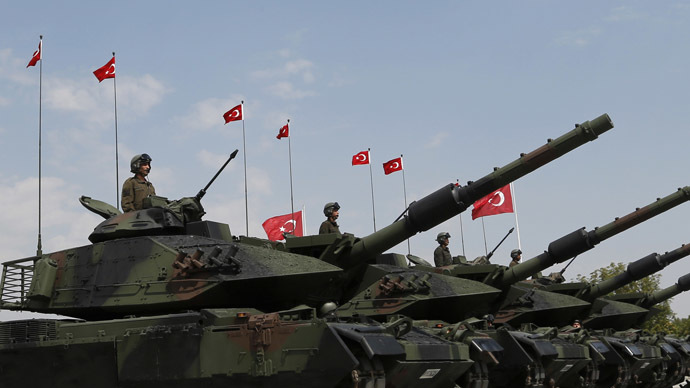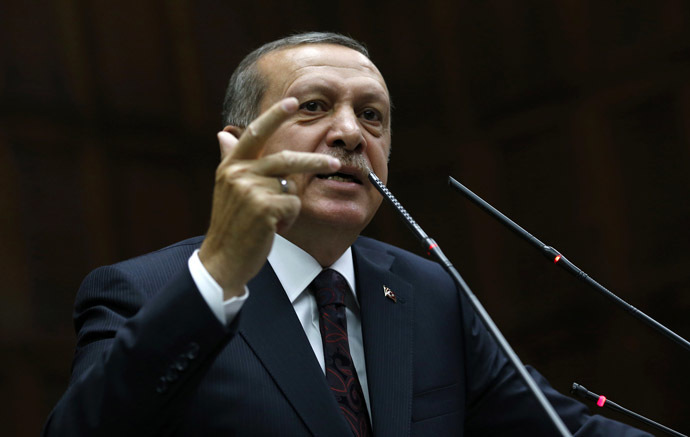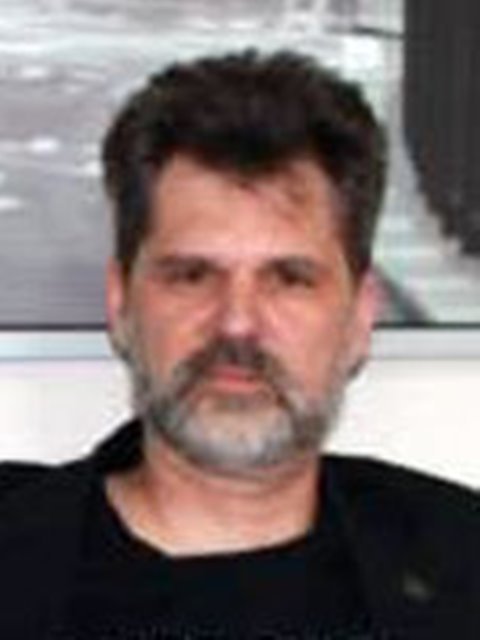Searching for casus belli: Turkey’s assault on Kassab?

In view of Turkey's strenuous relationship with its neighbor, Armenia, the reports of Turkish involvement in the military attack on the Syrian city of Kassab seems disturbingly timely, apposite, and rather eerie.
There appear to be clear indications that this border town in the Latakia province of Syria, just south of Turkey's Hatay province, was attacked by "NATO-backed mercenary forces" and members of the "Turkish Armed Forces" on March 21, as worded by the independent researcher and peace activist, Cem Ertür. This military action took place a mere nine days before Turkey's local elections, which reaffirmed Tayyip Erdogan's position as the nation's unquestioned leader. And just days before election day, a leak revealed that Turkey had been planning a false flag attack that would have allowed Turkish troops to intervene directly in Syria's not-so civil war.
The leaked conversation between Foreign Minister Davutoğlu and other prominent members of the Turkish government focused on a possible staged attack on the Tomb of Suleiman Shah, Turkey's exclave on Syrian territory. The wily FM had been publicly talking about Turkey's willingness to intervene militarily since March 14, when he stated, during the third Trilateral Meeting of Ministers of Foreign Affairs of Turkey, Azerbaijan and Iran held in the Turkish city of Van, that "Turkey has the right to take any kind of measures for [the] security and stability [of the Suleiman Shah tomb]." As such, the FM was merely reiterating the PM's words, uttered on August 5, 2013, namely that the "tomb of Suleiman Shah [in Syria] and the land surrounding it is our territory. We cannot ignore any unfavorable act against that monument, as it would be an attack on our territory." Turkey has thus been on the lookout for a casus belli that would force its government to commence hostilities beyond the country's borders on Syrian soil.
Later in the same month of last year, Erdogan’s government allegedly “believed they could get Assad’s nuts in a vice by dabbling with a sarin attack inside Syria – and forcing Obama to make good on his red line threat," as the award-winning American investigative journalist Seymour Hersh said in an article in the London Review of Books, quoting an unnamed former senior US intelligence official. Hersh sees the Turkish PM as one of the main movers in the Syrian conflict. And once US troops were on the ground in Syria, Turkish soldiers would arguably follow suit. Even though the official line has always been that the Assad regime and only the Assad regime was responsible for the use of chemical weapons in Syria, the idea that the Ghouta attack was a false flag operation does not appear too far-fetched really.

As early as September last year, a lone voice belonging to Peter Lee (writing for CounterPunch, well-known for “muckraking with a radical attitude”) opined that “that the Syrian gas attack [in Ghouta] might have been a false flag attack designed to force the Obama administration to intervene in Syria.” In fact, in September 2013, the infamous Turkish activist, and former leader of the terrorist group THKP-C Acilciler, Mihrac Ural, also claimed that Turkey had been responsible for the sarin attack in Ghouta. The wily FM Davutoglu incidentally blamed Ural for the May-2013 double bomb-attack on the Turkish town of Reyhanli, arguably another false flag operation.
Now, in 2014, Seymour Hersh sees Turkey doing the groundwork for the US, but from an internal Turkish point of view, one could argue that Hersh’s claim all but underlines Tayyip Erdogan's desperate search for a legal justification to send Turkish troops into Syria, a veritable casus belli – in this case one that would have even absolved Turkey from charges that it acted unilaterally, as it would have first-and-foremost been America's awesome airpower, arguably followed by Turkey's armed forces on the ground, that would have conducted "an Assad-destroying attack." It thus appears to be no surprise that Turkey easily dismissed the words of a "five-time Polk winner and recipient of the 2004 George Orwell Award," with Deputy Prime Minister Bulent Arinc, for instance, maintaining that “the [Hersh] claims based on anonymous sources have been conclusively rejected by White House officials,” in good parrot fashion.
The state of war?
The frantic search for a legal casus belli continues today and this is underscored by the recent actions of Turkey's air defense system: on March 23 a "Syrian military jet was intercepted near the Syrian-Turkish border after it violated Turkish airspace,” Prime Minister Erdogan said. Conflicting reports said the jet was shot down from the ground and crashed on the Syrian side. The violation of a sovereign nation's airspace and/or territory constitutes a clear casus belli. The PM quickly grasped the opportunity, saying: “A Syrian plane violated our airspace. Our F-16s took off and hit this plane. Why? Because if you violate my airspace, our slap after this will be hard.”
Still, as reported by the Turkish Dogan News Agency, the downed jet crashed in the buffer zone between Syria and Turkey’s Hatay province. Additionally, a Syrian Air Force spokesman declared that the downed plane had been "pursuing gangs of terrorists over Syrian territory and did not violate Turkish airspace". As a result, Turkey's F-16s did not succeed in making a convincing case for legally justifying a one-sided declaration of war on the part of Turkey. Nevertheless, Erdogan seems particularly keen to make people believe that a clear casus belli occurred, declaring that "Syria is in a state of war” with Turkey.

Erdogan seems to be searching for pretexts and legal justifications for invading neighboring Syria. The reason seems to be that the prime minister would like very much to turn himself into a war hero, as a preamble to his "election" to the post of president of the republic on August 10, 2014. Thirty years ago, Turkey's successful intervention in Cyprus transformed the somewhat lackluster-looking and peace-loving Bulent Ecevit into the "Conqueror of Cyprus" when the Turkish army occupied 37 percent of the island's territory. Alas, so far Erdogan has not been successful in the presentation of a convincing casus belli that could turn him into the "Conqueror of Syria" and Turkey's first popularly elected president who "saved" the tomb of Osman Gazi's grandfather, just beyond the nation's borders.
Turkey v Syria
Legal justification aside, Turkey has been involved in the armed effort to unseat Bashar Assad since the very beginning, supplying, arming and supporting opposition forces overtly as well as covertly – and one should not lose sight of the fact that this armed effort, now in its fourth year, has so far claimed the lives of more than 146,000 people.
At the same time, Turkey's National Intelligence Organization (MIT) has also been active in providing "weapons and ammunition, bulletproof jackets and electronic devices" to opposition forces described as "Al-Qaeda" by the politician Abdullatif Sener, an erstwhile friend of Erdogan's and now one of his most vocal critics. Arguably, Turkey thus appears to support the Free Syrian Army (FSA) as well as the Islamist opposition to the Damascus regime, the Al-Nusra front as well as the Islamic State of Iraq and the Levant (better known by the acronym ISIS or ISIL), both popularly known as "Al-Qaeda affiliates." And now, the claim is that the Turkish army was part of the opposition assault on the Syrian city of Kassab, where ethnic Armenians make up two-thirds of the population.
Local villagers indicate that over 1,500 mercenaries conducted an outright assault, under the cover of heavy artillery fire from Turkey's armed forces. The Turkish army apparently used mortar, artillery and rocket shelling by armored vehicles, placed just across the border, and coordinated heavy machine-gun fire by helicopters making surgical sorties. According to the Tehran-based Al Alam International News Channel's exclusive report of March 25, "Al-Qaeda’s al-Nusra front have raised their flags over several Turkish military tanks near Kassab, as a sign of having the area under their control.” The report argues that the town is of strategic importance, as holding it allows "militant factions ... to smuggle in arms for themselves, [and] to demand a cut when other factions use those crossings.” The fact that "Kasab and its surrounding villages are Armenian Christian-dominated areas" seems irrelevant.

In New York, Syria's Permanent Representative to the UN, Dr. Bashar al-Jaafari asserted that the "UN Secretary-General and the president and members of the Security Council (UNSC) have been alerted by sending seven official letters to the UNSC on the dangerous violations committed by Turkey in the north of Syria,” or the province of Latakia, regarded as the heartland of Assad’s Alawite sect. But Turkey's alleged covert action south of the province of Hatay did not bring about any lasting changes on the ground in Syria, as Assad's forces, backed by Lebanese Hezbollah, seem to be gaining more and more ground. Just a few days ago the UK's Defense Secretary Philip Hammond, while visiting Qatar, affirmed that "it is now clear, partly because of fragmentation within the opposition, [that] the Assad regime has been able to regroup and consolidate its position.”
On March 26, Syria's President Assad even had a meeting with an Armenian parliamentary delegation headed by the MP Samvel Farmanyan. The latter conveyed a message from Armenia's President Serzh Sargsyan, condemning the Turkish-backed terrorist attack on the town of Kassab. Even though Syrian government forces claimed to have retaken Kassab on April 1, the president of the Syria National Coalition, Ahmad Jarba, toured Latakia province, including the town of Kassab, as reported by the Lebanese paper Daily Star. The above-mentioned Turkish activist (or terrorist, if you will), Mihrac Ural, recently spoke to the Turkish opposition press, making no bones about his convictions: "This peace town of Kassab is whimpering under the sounds of bombs and gun fire. It is being bombarded by soldiers and jihadist gangs under the command of Erdogan. Jihadists are leisurely crossing the border and attacking the town.”
The fact that the province of Latakia is an Alawite stronghold and Kassab an "Armenian" town appears particularly poignant in view of Erdogan's domestic policy of Sunnification, and the approaching date of April 24 when the victims of the Ottoman policy of ethnic cleansing in the period between 1915 and 1923 are commemorated. President Sargsyan's message to Assad reveals a certain unease that could make this year's commemoration of the deportation of numerous Armenian intellectuals in 1915, as a preamble to the enactment of the so-called Tehcir Law on May 29, particularly painful for Turkey. Still, it would appear that officially Turkey's government is not all that much concerned about the events in Kassab. In contrast, the search for a legally-binding casus belli that would transform Tayyip Erdogan into a war hero and "Conqueror of Syria" appears to continue, particularly now that Bashar Assad is re-gaining the upper-hand in the conflict.
The statements, views and opinions expressed in this column are solely those of the author and do not necessarily represent those of RT.
The statements, views and opinions expressed in this column are solely those of the author and do not necessarily represent those of RT.













